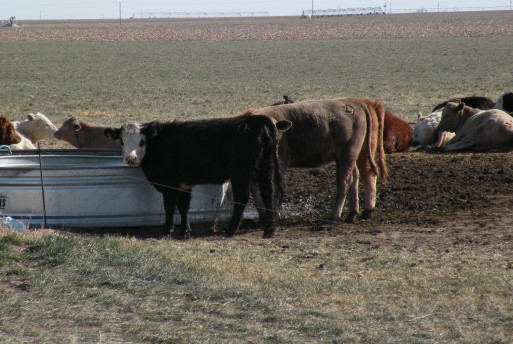
Agricultural News
Cattlemen Not Happy With Navigable Waters Language Under Fire Again in Congress
Wed, 21 Apr 2010 20:10:12 CDT
 The National Cattlemen's Beef Association (NCBA) is strongly opposing the so-called "America's Commitment to Clean Water Act," introduced earlier today by Rep. James Oberstar (D-Minn.). The Act would remove the word "navigable" from the definition of "waters of the United States" under the Clean Water Act, granting the federal government unprecedented regulatory authority over all waters regardless of whether or not they have any environmental significance. (Could this water tank with some mud puddles around it be subject to EPA control? Maybe)
The National Cattlemen's Beef Association (NCBA) is strongly opposing the so-called "America's Commitment to Clean Water Act," introduced earlier today by Rep. James Oberstar (D-Minn.). The Act would remove the word "navigable" from the definition of "waters of the United States" under the Clean Water Act, granting the federal government unprecedented regulatory authority over all waters regardless of whether or not they have any environmental significance. (Could this water tank with some mud puddles around it be subject to EPA control? Maybe)
"Removing the word 'navigable' from the definition of waters of the United States is a non-starter for us," said Tamara Thies, NCBA chief environmental counsel. "Navigability is essential to maintain the appropriate federal-state balance that has always been the hallmark of the Clean Water Act. Without it, the reach of the federal government's strong arm will be limitless. While this bill claims to exclude 'prior converted croplands' from regulation under the Act, it actually takes away the authority of the Secretary of Agriculture to determine which lands meet that definition and gives it to the Administrator of the Environmental Protection Agency.
"In addition, it's perplexing that the author claims that the bill will not regulate groundwater when a groundwater exclusion is not included in the statutory language of the bill. This bill would take away state and private property rights and would only lead to endless litigation and bureaucratic red tape. The result would actually hamper our nation's ability to maintain clean waters."
Currently, waters under the federal jurisdiction of the Clean Water Act are defined as "navigable waters of the United States." Other waters are subject to regulation by individual states, which are better equipped to manage their own unique geographical concerns.
"Ranchers rely on clean water to maintain healthy animals and land. And the current Clean Water Act has been highly successful in achieving those goals thanks to the strong partnership that exists between the federal and state governments which allows states flexibility to manage their own land and water in a way that makes sense," Thies continued. "Our founding fathers designed our system of government to prevent improper federal control over state and private property rights. It's unfortunate that some members of Congress wish to take away those important rights through this legislation."
NCBA and PLC continue to oppose similar legislation which narrowly passed out of the Senate Committee on Environment and Public Works last June. Due to strong opposition, S. 787 (the Clean Water Restoration Act) has yet to receive a vote in the full Senate.
WebReadyTM Powered by WireReady® NSI
Top Agricultural News
More Headlines...



















